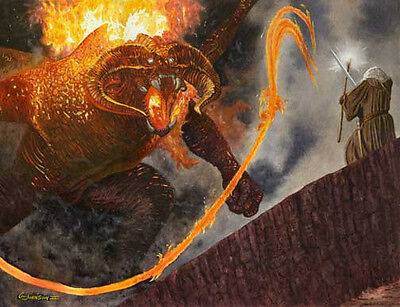

-
| - | - | - | - | - |
| Dungeons & Dragons | - | Dragon magazine | - | The Dragon #29 |
Mick McAllister’s article “The
Chamber of the Godgame,” which
appeared in the Sept. ’78 issue of The Dragon raises some thoughts
about heroic acts in D&D. Self-sacrificing deeds such as
holding the
battle line while the other characters retreat, acting as point man
(opening
all doors and being the first to investigate anything), and offering
oneself prisoner if the rest of the party is let free usually result
in a character’s
rapid death. As a result, players want NPC’s to be point man and
charmed orcs to open doors. Experienced players are usually very
paranoid about subjecting themselves to any danger above the norm.
Dungeons and Dragons, as is written, should play like
a good fantasy
story. However, any exciting fantasy writer delights in individual
acts of heroism which would be theoretically impossible in D&D.
The
great dwarven warrior Hendel in The Sword of Shannara,
for example,
outwits and escapes from an entire army of gnomes and later effectively
fights dozens of them. (In this book, gnomes are roughly equivalent
to
orcs in D&D.) One of my players, after reading The
Sword of Shannara
remarked that those adventurers must have had a very lenient referee,
because he let them get away with so many seemingly impossible feats.
I began thinking, then, that there should be more heroic acts in my
campaign. Characters in my game have become reluctant to do anything
daring ever since a high level cleric, while opening a chest, was
crushed by a boulder which dropped from the ceiling. Therefore, I have
devised a set of rules to use for heroic acts and self-sacrificing
deeds.
The referee should first determine if an action qualifies for an
“heroic act.” These rules should only be used when one or two characters
are acting for the rest of their group in situations when the life
or
freedom of the entire party is on the line. If an act qualifies, the
one or
two characters attack as characters twice their levels (Of course,
magicusers
do not increase the number of spells usable, but the effects of the
spells would be increased in some cases) and they halve any hit points
taken. All other abilities (such as speed, thieve’s abilities, special
class
abilities, etc.) are plus 20%. This rule simulates the effect of adrenalin
on
a person in a life or death situation and the natural law present in
most
fantasy stories that good will triumph over evil.
For example, Zwolf and Norof were scouting ahead when they
should have been on night watch. A group of ten bugbears caught the
rest of the party asleep and captured them. They were imprisoned in
a
barred cave and the bugbears made camp outside of the cave. Zwolf
and Norof attempted to sneak into the bugbear camp to rescue their
friends. But Norof, having a dexterity of six, tripped over a branch
and
awakened the sleeping bugbears. Now Zwolf and Norof would normally
not have a chance against ten bugbears, but this would qualify for
an “heroic act.” Norof, a 5th level fighter, can take 30 hits but already
has five damage. For this battle, however, Norof effectively has 60
hit
points, but his previous hits taken are also effectively doubled to
ten.
Norof takes 20 damage in the battle (actually 40). At the end of the
battle
Norof reverts back to 30 hit points and now has 25 damage.
There are three other rules I use when a character sacrifices himself
to save the party: Anyone acting as point man gets plus 20% experience.
Anyone who prays after recently sacrificing himself has his level
stated as a percentage chance (clerics plus 10%) of getting a reaction
from the gods. (Assuming he has been loyal to his alignment.) Also,
any
individual act judged by the DM to be extremely heroic will be awarded
additional experience points (from 1,000-5,000).
The referee must always analyze the players intentions when using
these rules. If it seems the players are taking advantage of the DM’s
leniency he should not use them any longer. The referee should never
announce when he is using these “heroic act” rules. Warning: the
players should not be allowed to always rely on these rules in all
tough
situations; the referee must be very careful to use these rules
sparingly.
I feel this set of rules will increase the rewards for self-sacrificing
acts
and keep brave characters alive longer.